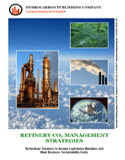Subscriber Login | About Us | Contact
HYDROCARBON PUBLISHING COMPANY
Translating Knowledge into Profitability®
A member of the Hydrocarbon Analytics Group
STORE
REFINERY CARBON DIOXIDE (CO2) MANAGEMENT STRATEGIES
Publication date:April 2010
Item#: C00900
Technology Solutions to Reduce Carbon Footprint and Meet Business Sustainability Goals.
Conclusion of the latest UN climate change meeting in Cancun, Mexico in Dec. last year has not resolved the confusion over new and pending greenhouse gas emissions laws for the global refining industry. Over the long term, oil companies are forced to change course, but which path should a refiner take?
Our very timely multi-client strategic report, "Refinery CO2 Management Strategies," is the most comprehensive study offering in-depth and insightful analyses of the latest technologies and the economic benefits of solutions to reduce carbon footprint in refinery operations. To help refiners prepare and formulate the right strategies, the Report examines three principal strategies—decreasing carbon intensity, lowering energy intensity, and carbon capture and sequestration (CCS).
View our prospectus for a detailed scope and focus of this Report.
Prospectus:
Recent legislative and market measures could have big impacts on refiners around the world. In the US, the Environmental Protection Agency (EPA) announced on Dec. 23, 2010 to limit GHG emissions from refineries. The EPA will propose performance standards in Dec. 2011 and issue final standards in Nov. 2012. Just a week before the EPA's declaration, California regulators approved the state's 2006 climate bill, known as AB 32, which calls for a carbon-cap-and-trade scheme targeting major CO2 emitters like power plants and refineries.
Elsewhere, the European Union recently voted to approve rules regarding benchmarks for the allocation of free CO2 allowances for refining and other industries, benefiting the most-efficient facilities in a given sector. Even China, the world's biggest emitter, has shifted away from its earlier strong opposition and now ensures that its emissions per unit of economic production will decline 40-45% by 2020.
In the "Refinery CO2 Management Strategies" Report, different case studies are performed to analyze various scenarios based on technology availability, operational savings and capital expenditures, and carbon prices. Based on our recent review of policies announced by global oil companies, as well as a direct survey of refiners around the world, oil firms have already begun to implement technologies to reduce CO2, as discussed in this Report.
Order now to join the list of many companies which have already ordered the study, discover the best options and strategies for your refineries, and learn about the benchmarking techniques adopted by most in the industry.
For further questions, please contact us at [email protected] or 610-408-0117.
View the Table of Contents for a detailed scope of the topics covered in this Report.
Table of Contents
Pricing Information
| Individual Use | Multiple Users/Library/Site license | |||
| Subscription Type | Electronic version | Print version | Others | Contact for pricing [email protected] +1-610-408-0117 |
| Pricing (US $) | $13,500 | $8,500 | ||
- Receive the Report in PDF format, in addition to print version, at an additional cost of US$5,000.00 ($8,500+$5,000)
- Prices include S&H
- All subscribers receive two print copies of the Report
- At the time of order, additional print copies of Report available at US$500.00 per copy. After initial order, extra copies will be charged at US$750.00 per copy plus shipping and handling costs
- Multiple-copy discounts are available. Please contact us for specific terms.
This Report is sold for the exclusive use of the subscribing companies and their employees. No other use duplications, storage in a retrieval system, transcriptions in any form or in any language or by any means of this Report or any part contained therein is permitted without written consent from Hydrocarbon Publishing Company, P.O. Box 661, Southeastern PA 19399 (USA).
Keywords: air pollution, alternative energy, alkylation, biofuel, biomass, carbon credits, carbon dioxide emissions, carbon footprint legislation, carbon footprint refinery offset, carbon tax, climate change, CO2 emissions, CO2 sequestration, crude distillation, catalytic reforming, energy efficiency, energy intensity, environmental impact of refineries, GHG or green house gas emissions/effect, global warming, hydrogen production, hydrotreating, hydrocracking, FCC, refinery carbon management or footprint analysis, solar power, tidal energy, wind power, refinery CO2 challenges, refinery carbon dioxide challenges, refinery carbon policy or management, refinery carbon emissions


